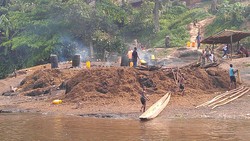Groups welcome Feronia’s decision to abandon plantation lands and enable communities in the DR Congo to thrive
RIAO-RDC and its allies in Africa and internationally congratulate Feronia Inc and its donors for returning several parts of its plantations to local communities in the Lokutu, Boteka and Yaligimba areas of the DR Congo. This initiative, which began with the company making several verbal announcements that it was abandoning parts of its plantations, has allowed the original people of these territories to finally take back parts of their lands that have been illegally occupied for over 100 years. Immediately after these announcements, the communities launched social and economic activities to realise the full potential of their land. The results, in terms of social development, have been dramatic and far exceed the achievements of any previous social activities undertaken by the company.
After the announcement of the abandonment of sections of plantations in Lokutu and Boteka, the communities introduced traditional and artisanal palm oil harvesting and production systems. Working conditions are now much better in these areas than when they were managed by Feronia. Moreover, since the company's costly offices in Kinshasa and London are not involved, all the value created by this work remains within the communities.
So far, several hundred hectares of lands have been abandoned to the communities, including 420 hectarees of abandoned oil palm plantations in the MWANDO groupement, LWETE Sector, ISANGI Territory, Tshopo Province, where the local communities have installed eight artisanal oil-making machines thanks to a crisis management system that has been put in place by teachers unemployed as a result of the COVID-19 pandemic and other intellectuals, engineers, factory managers, production managers and a personnel and accounting department that are able to quench the thirst of the affected communities to some extent, and the other surrounding communities, who come to freely stock up on oil to resell it further afield.
"We are happy to finally have access to lands that we have be kept out of for so long," says Mr. EBAMBOLA, crisis plant manager. "With access to these lands, we are able to resume our palm oil production, which was violently interrupted with colonisation. Since the beginning of the week, I alone have sold 15 drums of oil, which gives me 300 thousand Congolese Francs (US$150) in profit. That's seven times what you could earn working extremely hard for the company for a whole month."
"For me and the other women of our MWANDO community, the company now has to make their verbal announcements about abandoning the land official, by providing us with written documents" says Mwe GESIGA, a mother. "Without documents, this important initiative could be undermined, as it creates the impression that the company is only setting a trap. The peace that has finally been established between Feronia and the communities must not be put at risk."
The success of this first phase of the initiative is an impressive example of how development banks can actually contribute to the well-being of the Congolese people. With the recent announcement of a process to put Feronia Inc up for sale, we encourage the company and its lenders to quickly multiply the retrocession of lands throughout the entire area of Feronia’s oil palm concessions.
RIAO-RDC
Confédération paysanne du Congo (DRC)
JVE-Côte d'Ivoire
Muyissi Environnement (Gabon)
RADD (Cameroon)
REFEB (Côte d’Ivoire)
SEFE (Cameroon)
SEFE (Cameroon)
SYNAPARCAM (Cameroon)
YETIHO (Côte d’Ivoire)
YVE Ghana
Bread for All
GRAIN
WRM
WRM












